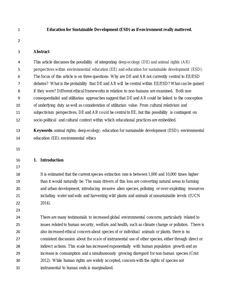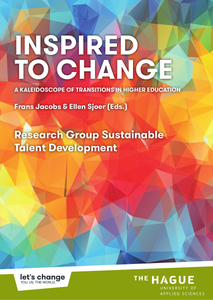The first part of this paper provides a series of conceptual critiques to illustrate how the recent move to inaugurate a “post-nature” world works to vindicate anthropocentric perspectives and a techno-managerial approach to the environmental crisis. We contend with this premise and suggest that troubling nature has profound implications for education. In the second part, we provide case studies from nature-based programs in The Netherlands and Canada to demonstrate how anthropocentric thinking can be reinscribed even as we work towards “sustainability”. Despite the tenacity of human hubris and the advent of the Anthropocene, we suggest these troubled times are also rich with emerging “post-anthropocentric” perspectives and practices. As such we offer “rewilding” as a means to think about education that moves beyond the romantic vestiges of “Nature” without lapsing into delusions of human exceptionalism. http://dx.doi.org/10.13135/2384-8677/2334 https://www.linkedin.com/in/helenkopnina/
MULTIFILE

Higher education is tasked with preparing students for a culturally diverse and globalizing world. Additionally, western nations have an increasingly diverse student population and know the success of their students will depend in part on being able to navigate diversity. There is therefore good reason for institutions of higher learning to promote and facilitate the development of ‘global citizens’ – people who can work and relate across borders and boundaries, both real and perceived. However, teachers are not necessarily equipped to foster this learning. Many teachers are used to a reproductive way of teaching while the learning that is needed here is identity learning, directed at dialogue, internally as well as externally. This chapter proposes the potential of creative, expressive and reflective writing as a way in which personal development – a form of a reflexive internal dialogue – can be fostered to promote cultural healing and global citizenship. The writing method will be described and a case study on cultural healing in the context of Canada’s reconciliation efforts with Aboriginal people will be used to illustrate the learning process involved. The processes of writing the self and re-narrating identity has several promising benefits for both students and teachers in higher education. First it allows us to learn more about ourselves and what blocks our learning (i.e. promotes self-reflection). Second, it allows us to change our story and our identifications and therefore choose differently (i.e. self-direction). Third, it is a companion on the road of life where we literally learn to talk and listen to ourselves and articulate the tacit knowledge that can be unearthed through narrative, journal, and poetic writing. Fourth, the method is playful and creative and although tears are frequently shed in the process, students report a great enjoyment in writing and sharing their stories with others. It is a meaningful dialogue about experience and also has the potential of promoting cultural (Lengelle, Jardine, & Bonnar, 2018) healing in the context of a very diverse student body (Banks, 2015). It also has the potential for creating new bonds in the classroom and allows teachers in higher education to engage in the difficult work of facilitating global citizenship learning. The internal dialogue described here also allows us to ‘clean up’ judgements and become aware of the need to reach out to others. Not only the actual sharing of vulnerable writing in a class or online setting shows us we are not alone, but ‘writing the self’ focuses deliberately on where we have become fearful about our own and others’ identities and allows us a learning process to unearth those things, heal them in order to reach out to others.
DOCUMENT

At the present time, nearly all Dutch nursing schools are searching for suitable ways to implement technology-based healthcare in their curriculum. Some Universities chose elective education, others a mandatory solution. Several studies were executed to determine competencies needed by nurses in order to work with technology-based healthcare. In 2016 a nationwide new curriculum for nurses has been published. Providing technology-based healthcare is included under the core competencies of this new curriculum. All baccalaureate nursing educational institutes must implement this new curriculum at the start of 2016 which will have a huge impact on the implementation of technology-based healthcare in the education programs. In the future, technology centers from Universities will collaborate and specialize, partner with technology companies and crossovers between information and communication technology and healthcare education will be expanded.
DOCUMENT

The advantages and drawbacks of components of flexible assessment have been studied mostly from the standpoint of students and, to a lesser extent, teachers. A gap persists in understanding the collective perspectives of teachers and students concerning flexible assessment. This study aimed to explore experiences and perspectives of students and teachers regarding flexible assessment within the specific context of nursing education. Seven focus groups comprised four sessions with teachers and three with students, each involving 5-8 participants. Results showed that students and teachers have a predominantly positive perspective towards flexible assessment. They acknowledge the opportunities that flexible assessment provides for diverse forms to present evidence. However, concerns were raised regarding the design of flexible assessments, issues of fairness in rating evidence, and the understanding among teachers and students regarding the assessment processes. Additionally, discussions focused on the perceived benefit of flexible assessments, particularly concerning the time investment required for their implementation and evaluation. In conclusion, the success of flexible assessments is contingent on the careful consideration of its design, ensuring equitable evaluation of evidence, and fostering comprehensive understanding among both teachers and students. Recognizing potential disparities in views of students and teachers offers valuable insights into the effectiveness of flexible assessment. Achieving a balance between the flexibility of assessment formats, aligned forms of evidence, and an appropriate rating methodology is crucial for effective implementation.
DOCUMENT

This article discusses the possibility of integrating deep ecology (DE) and animal rights (AR) perspectives within environmental education (EE) and education for sustainable development (ESD). The focus of this article is on three questions: why are DE and AR not currently central to EE/ESD debates? What is the probability that DE and AR will be central within EE/ESD? What can be gained if they were? Different ethical frameworks in relation to non-humans are examined. Both non-consequentialist and utilitarian approaches suggest that DE and AR could be linked to the conception of underlying duty as well as consideration of utilitarian value. From cultural relativism and subjectivism perspectives, DE and AR could be central to EE, but this possibility is contingent on socio-political and cultural context within which educational practices are embedded. https://doi.org/10.1016/j.envdev.2014.09.001 https://www.linkedin.com/in/helenkopnina/
MULTIFILE

This book consists of thirteen chapters with elaborations on several perspectives of the Universities kaleidoscope. The aim of our book is not meant as a purely scientific endeavour, but as a contribution to the future development of universities. The style is popular science, primarily targeted at our lecturers as one of the most important social capitals we have. As the book is addressed to them, all chapters discuss their role, directly or indirectly. The focus is always on the ability to offer students the best possible learning environment. This requires first and foremost a dialogue on the professional diversity of lecturers. Innovative behaviour appears to be crucial for all of them. In addition to these abilities of lecturers, the design of the curriculum is essential for all parties involved. A curriculum largely determines the themes and contents addressed, how work-related, engaging and stimulating learning activities are developed and how lecturers design these on the micro level based on their expertise. Frans Jacobs & Ellen Sjoer (Editors). (See also seperate chapters).
DOCUMENT

In this case study, we want to gain insights into how residents of three municipalities communicate about the new murder scenario of the cold case of Marianne Vaatstra and the possibility of a large-scale DNA familial searching. We investigate how stakeholders shape their arguments in conversation with each other and with the police. We investigate the repertoires that participants use to achieve certain effects in their interactions with others in three focus groups. The results show that the analyzed repertoires are strong normative orientated. We see two aspects emerge that affect the support for large-scale DNA familial searching. These are: 1. Cautious formulations: respondents showed restraint in making personal judgments and often formulated these on behalf of others. Participants would not fully express themselves, but adjusted to what seemed the socially desirable course. 2. Collective identity: respondents focused on the similarities between themselves and the needs, interests, and goals of other participants. Participants also tried in a discursive way to convince each other to participate in the large-scale familial searching. These two major discursive activities offered the communication discipline guidance for interventions into the subsequent communication strategy.
MULTIFILE

In this chapter, we propose that the democracy we wish to see out in the world is influenced by the quality of our own “inner democracies”—that is: the quality of the democracies among and between the selves or voices in the landscape of the self. We must find ways out of the I-prisons we experience and perpetuate. With this in mind, we propose that ”writing the self,” a method whereby creative, expressive, and reflective writing is used to cultivate an internal dialogue and construct a new identity narrative (Lengelle, 2014), can assist in reshaping our stories about ”the Other and ourselves” and can contribute to personal and cultural healing and reconciliation. The inner dialogue reconciled is foundational for the external dialogue at the heart of global citizenship within education. Indeed, as Schellhammer argues, we must cultivate the self in order to become inter-culturally competent, and this includes facing shadow aspects through truthful dialogues with the self and caring for the self. https://doi.org/10.1007/978-3-319-62861-5_6 LinkedIn: https://www.linkedin.com/in/reinekke-lengelle-phd-767a4322/
MULTIFILE

This article will discuss the role of environmentalism in environmental education (EE) and education for sustainable development (ESD) in the context of ecopedagogy. Ecopedagogy calls for the remaking of capitalist practices and seeks to re-engage democracy to include multispecies interests in the face of our current global ecological crisis. In this article, the written reports by international business students on the documentary film If a Tree Falls about a radical environmental movement will be discussed. The aim of this article is to reflect upon the question of whether confrontational questions posed by radical environmentalism can move students to re-examine certain central assumptions within their own society and education. The analysis of students’ individual writing assignments after viewing the film is placed in the context of the discussion about the aims of education in relation to environmental advocacy. This case study seeks to provide an example of how environmental advocacy and the objective of pluralistic education can be combined as mutually supportive means of achieving both democratic learning and learning for environmental sustainability. https://doi.org/10.1177/0973408215569119 https://www.linkedin.com/in/helenkopnina/
MULTIFILE
